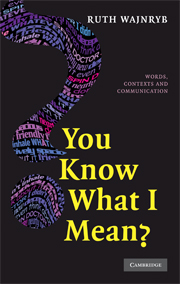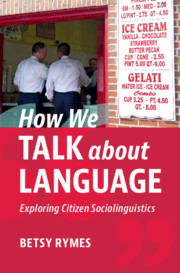You Know what I Mean?
Does a word mean what it says? Sometimes - but not always. Everyone thinks that meaning is contained within words - like sardines in a tin, or milk in a bottle. After all, words are nice stable things that you can look up in a dictionary aren't they? But dictionaries only take us so far… If you eavesdropped on a teenage conversation, rushing to a dictionary - with its definitions frozen in time - wouldn't help much. Who's using a word and to whom, in what context, for what purpose - all these influence the meaning of the language we use. The word's origins and history (its 'genetics') also help. Try teaching yourself another language from a phrasebook and you'll soon learn that you can be correct, in the formal sense, but still way behind the times in reality. In this book Wajnryb considers these and other questions to explore how and why our language works the way it does.
- Offers a fresh approach to thinking about language
- Includes lots of contemporary references and examples to illustrate points
- Each section is self-contained so readers can browse rather than read from cover to cover
Product details
October 2008Adobe eBook Reader
9780511426919
0 pages
0kg
This ISBN is for an eBook version which is distributed on our behalf by a third party.
Table of Contents
- 1. Nuts and bolts
- 2. Word behaviours
- 3. Between the lines
- 4. Political
- 5. Inspired by books, films and media
- 6. Gender
- 7. Text-types
- 8. Fields of discourse
- 9. Word biographies
- 10. World Englishes.





